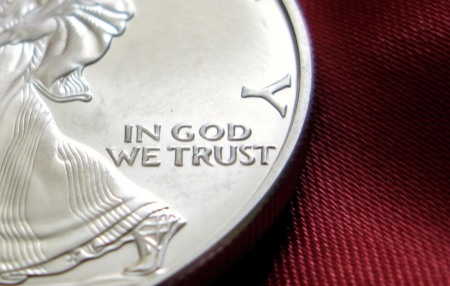'In God We Trust' Legal Battle Renewed by Atheist Activist Michael Newdow

Atheist activists are continuing with their fight to have "In God We Trust" removed from U.S. currency by filing a new federal lawsuit, this time in Akron, Ohio.
Michael Newdow, an atheist activist from California, filed the latest lawsuit in Ohio, listing 41 people as plaintiffs on the complaint, including the Northern Ohio Freethought Society and residents of Ohio and Michigan.
The lawsuit, which refers to "God" as "G-d," claims that the presence of "In God We Trust" on U.S. currency violates the separation of church and state and creates an anti-atheist, pro-Christian sentiment in the U.S.
"The 'In G-d We Trust' phrase has continued to be a tool used to perpetuate favoritism for (Christian) Monotheism," the 112-page lawsuit states, adding "It has also continued to perpetuate anti-Atheistic bias."
The lawsuit goes on to argue that the "[…] constitution specifically states that 'no religious test shall ever be required as a qualification to any office or public trust under the United States.'"
"In other words, as James Madison wrote: 'There is not a shadow of right in the general government to intermeddle with religion. Its least interference with it would be a most flagrant usurpation,'" the lawsuit adds.
Newdow has carried out similar legal fights before.
In 2004, after suing for the removal of "under God" from the Pledge of Allegiance, his case was heard by the U.S. Supreme Court. The court did not decide on the merits of the case but instead said Newdow had no standing to sue.
And in 2013, he partnered with the Wisconsin-based Freedom From Religion Foundation to sue the U.S. Treasury over the motto on currency.
The previous lawsuit argued that the motto forces nonbelieving Americans to proselytize whenever they use American currency.
"Our government is prohibited from endorsing one religion over another but also prohibited from endorsing religion over nonreligion. The placement of a theistic ideal on our nation's currency violates this stricture and is therefore unconstitutional," FFRF Co-President Dan Barker wrote in 2013.
"As Anne Nicol Gaylor, FFRF's principal founder, has always put it, 'In God We Trust' isn't even accurate. In order to be accurate, it would have to say 'In God Some of Us Trust,' and wouldn't that be silly?" Barker added.
The atheist group's lawsuit was dismissed in 2013 by a New York federal district judge who determined the lawsuit's argument to be unfounded.
"The Supreme Court has repeatedly assumed the motto's secular purpose and effect, and all circuit courts that have considered this issue—namely the Ninth, Fifth, Tenth, and D.C. Circuit— have found no constitutional violation in the motto's inclusion on currency," the 2013 ruling stated.
Newdow then appealed the case to the Second Circuit Court of Appeals in 2014, but was ruled against for a second time.
"The Supreme Court has recognized in a number of its cases that the motto, and its inclusion in the design of U.S. currency, is a 'reference to our religious heritage,'" the Second Circuit Court of Appeals wrote in 2014. "We therefore hold, in line with the Supreme Court's dicta, that [the motto appearing on currency does] not violate the Establishment Clause."





















